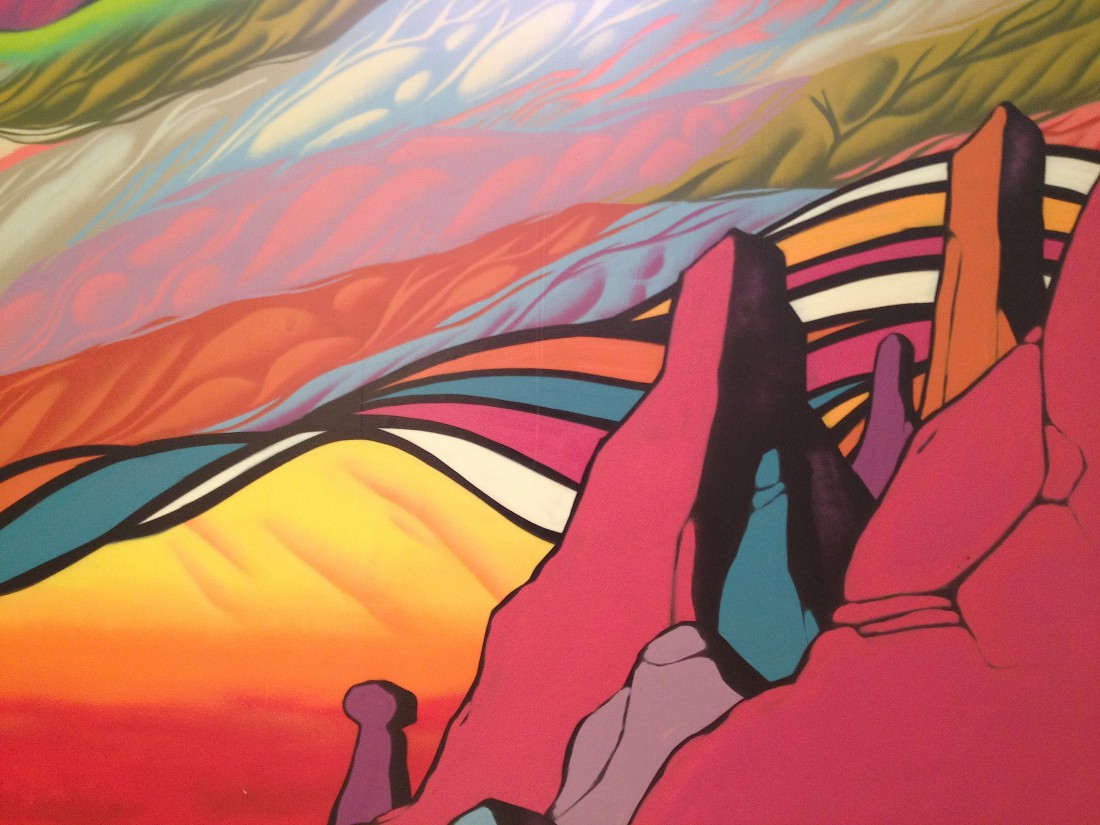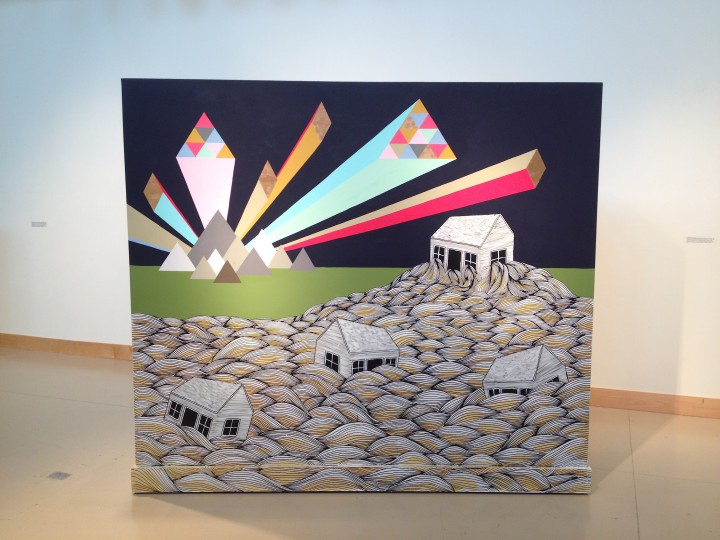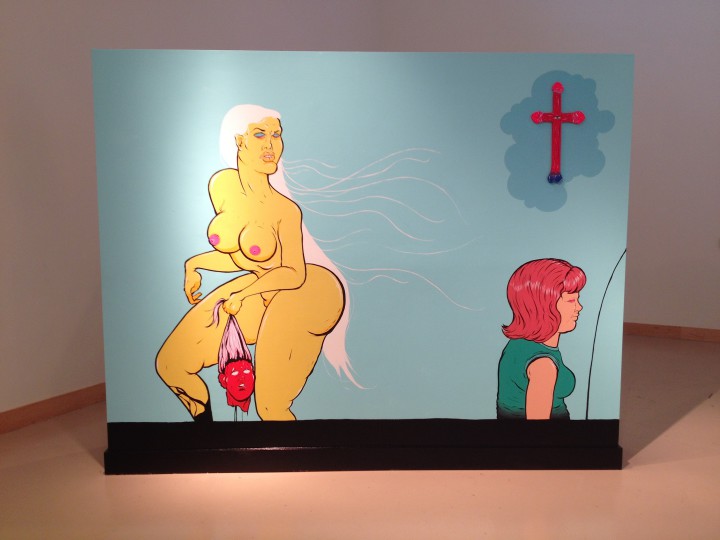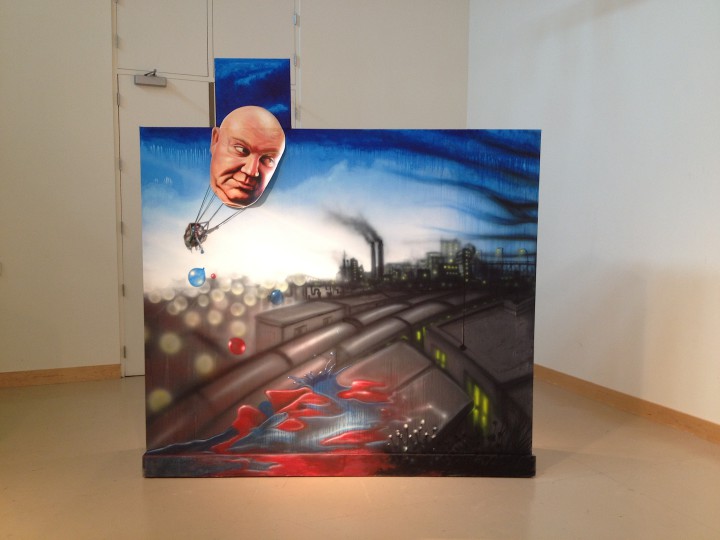A four-person crew containing some of Asheville’s most notable muralists and painters recently took to the walls of Cullowhee. But those artists — Gus Cutty, Hannah Dansie, Alli Good and Ian Wilkinson — haven’t scaled the exteriors of Cullowhee’s restaurants, overpasses or collegiate edifices, as one might expect. Rather, they’ve taken up their brushes, paints and aerosols inside the gallery for Teetering On The Edge Of Uncanny, an exhibition of temporary murals, on view at Western Carolina University’s Fine Arts Museum through Friday, Nov. 7.
That these artists are culled from a stylistically similar enclave of Asheville’s art scene is no coincidence. That’s the doing of David Brown, the museum’s director and the exhibition’s organizer. “Like most urban areas, Asheville has a vibrant mural scene that’s been ongoing,” he says. “I certainly knew that I’d have a great group to pull from.”
At its core, the project and resulting exhibition successfully captured the improvisational energy of graffiti and street art, as created for and within the museum’s track-lit gallery setting. “I began looking for both established and up-and-coming artists from around the region,” Brown says. “[Artists] who had the chops, the energy and the interest to tackle the project.” Each of the muralists, he says, was intentionally given short notice of the assignment to amplify the project’s improvisational aspects. Once assigned, they had only two or three days to design and paint the entirety of the monolithic freestanding walls, each of which has two roughly 8-by-8-foot walls with 2-foot-wide connective sides.
Mural by Hannah Dansie.
Good’s mural features a bulbous, canary yellow vixen. She’s not unlike the evolving stock of drooling, razor-toothed grotesques that Good makes regular use of in her more familiar small-scale paintings. Only now, she’s over 6 feet tall, with mirrorlike sky-blue eyes and platinum hair. She’s clutching the withered mane of a shrunken head in one hand and fiercely eyeing a short, red-eyed girl who’s kneeling in prayer (perhaps) below a phallus-tipped cross. On the reverse side, a three-eyed, yellow-tongued devilish beast rests atop a cluster of bulging, oil-spurting breasts.
Wilkinson’s piece offers a whimsical aerial view of a steely gray urban landscape, as seen by a hot air balloon. This seemingly overworked city lies below a dark sky, spotted with streaky black clouds and the white light of a rising sun. It’s shrouded in a smoky, early morning fog that’s intermittently broken by the neon green glow of streetlights and windows. From the balloon (which in this case is a bald man’s head rather than a candy-striped sphere), a monkey tosses out blue and red paint bombs, dotting the passing railcars and tops of buildings with bursts of color.
Cutty’s work departs from Wilkinson’s and Good’s barbarous and frenzied settings. It depicts, instead, a tranquil western landscape. Purple, pink and navy blue spires and rocky cliffs are layered above an evening sky and desert floor. The scene drops into total darkness, backed by a blood-red sunset. Hovering in the cloud line is a glowing peyote mystic-type character, with bright pink eyes and a stony purple and blue face. He wraps around the panel, where his head trails off to become a ruffle of billowing clouds.
Across the room, Dansie’s piece portrays an equally deserted landscape. Only here it’s one of post-societal development, rather than serene isolation. A series of small Monopolylike homes are engulfed by what looks like a mountain of spaghetti. Behind them, a cluster of explosive triangular mountains sits on a moss-green plain and a deep blue nighttime sky. There’s a sense of abandonment in the the empty domestic shells: They’re left by the wayside and swallowed by the monochromatic hill that they once set out to colonize.
Individually, each piece offers a view into each artist. Wilkinson and Cutty reduced the scale their work, while Good and Dansie, who usually create smaller pieces (barring the occasional mural commission), went big. That size difference, coupled with the project’s compacted timeline, was new territory, says Wilkinson. “It’s kind of a celebration of something that I personally don’t normally do.”
Together, though, these works form a glimpse of the Asheville mural scene, one that seemingly mimics an abstract sculpture garden built of murals rather than stones. But unlike stones, the works are temporary. “We’ll paint over the walls once the show finishes in November,” Brown says, “then [they’ll] exist only in a documentary form.”
WHAT: Teetering On The Edge Of Uncanny
WHERE: Western Carolina University’s Fine Arts Museum, wcu.edu/museum
WHEN: Through Friday, Nov. 7








Before you comment
The comments section is here to provide a platform for civil dialogue on the issues we face together as a local community. Xpress is committed to offering this platform for all voices, but when the tone of the discussion gets nasty or strays off topic, we believe many people choose not to participate. Xpress editors are determined to moderate comments to ensure a constructive interchange is maintained. All comments judged not to be in keeping with the spirit of civil discourse will be removed and repeat violators will be banned. See here for our terms of service. Thank you for being part of this effort to promote respectful discussion.